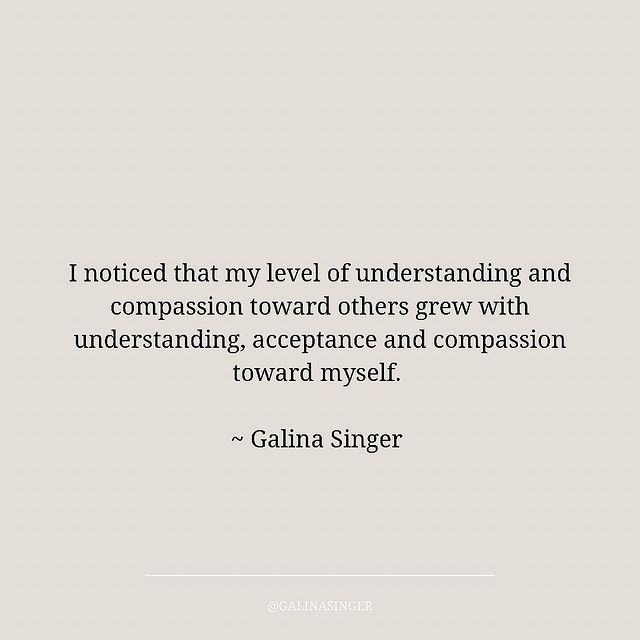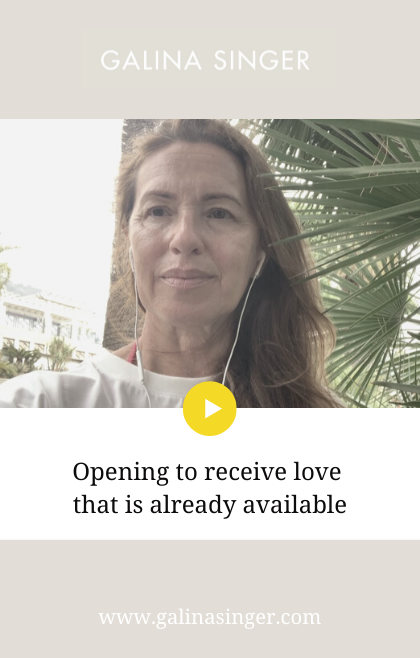Our feelings, reactions and triggers speak of our relationship with ourselves.
Understanding, Unlearning, Becoming – Galina Singer Weekly Journal #1
We are all traumatized children
The only way we’ll be judging and criticizing externally is when we do it internally.
Being compassionate toward others does not mean we accept anything.
It just means that we do not need to put others down when we do not agree with their behavior. We can communicate calmly and also make decisions about what serves us – without criticism of the other.
We are all traumatized children trying to make sense of our relationships and the complex feelings they cause.
Criticizing and judging others reflects our own woundedness
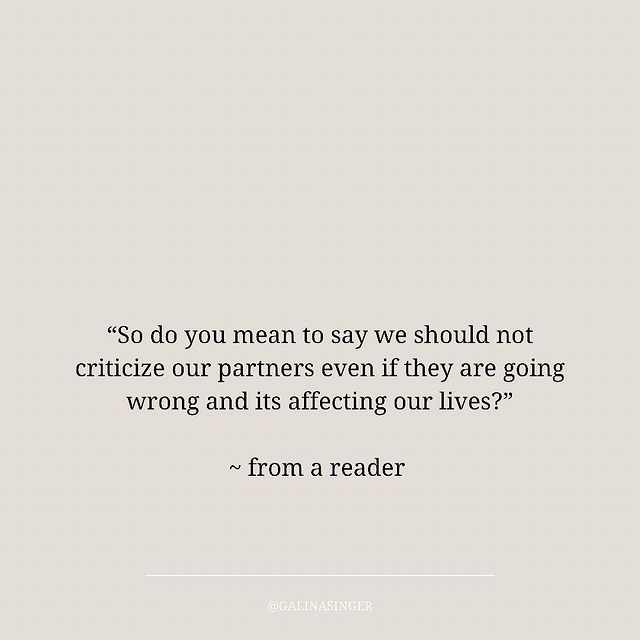
I’m not into “shoulds”.
So my answer is: you are free to do what you want. But how is your complaining and criticism working out for you?
I’ve criticized my husband, just like I’ve observed my mother criticize my father and you know what? It did not serve any of us.
My mother complained for as long as I remember and stayed in a toxic dynamic, which taught me that marriage is a trap. Her criticism did not change my father, he became more estranged, that’s all.
So here’s what I think now: We can communicate about what does not serve us, and we can communicate our boundaries. We can also choose to leave if the relationship is toxic.
But criticizing and judging others reflects our own woundedness and how critical and judgmental we are with ourselves. It is not our job to change another adult. (Unless they ask for it!) When we try to change our husbands or partners – we become their mothers. Not only is it not our job, it kills all that’s good in the relationship.
Telling a man what to do, criticizing him – that’s more of our own internalized toxic patriarchy at play: our own wounded toxic masculine.
The only way we’ll be judging and criticizing externally is when we do it internally:
by not honoring the feminine within ourselves, when we judge and criticize our bodies, our feelings, other women.
Love is fully self-sourced
As children, we had our needs for love and attention filled by other people, the caregivers in our lives. Since then, we have held on to this idea that love is something we get from others. Depending on our attachment history—how well and consistently our caregivers were able to respond to our needs—we seek for love to be delivered in a particular way. Through further cultural imprint, we learn that love is received and given via various love languages, which we must know and master.
There is a whole coded dance around the “delivery” of love as we try to ensure that we can “get” it in the specific way that we crave it.
The truth is love is fully self-sourced. And it is our responsibility to cultivate it from within.
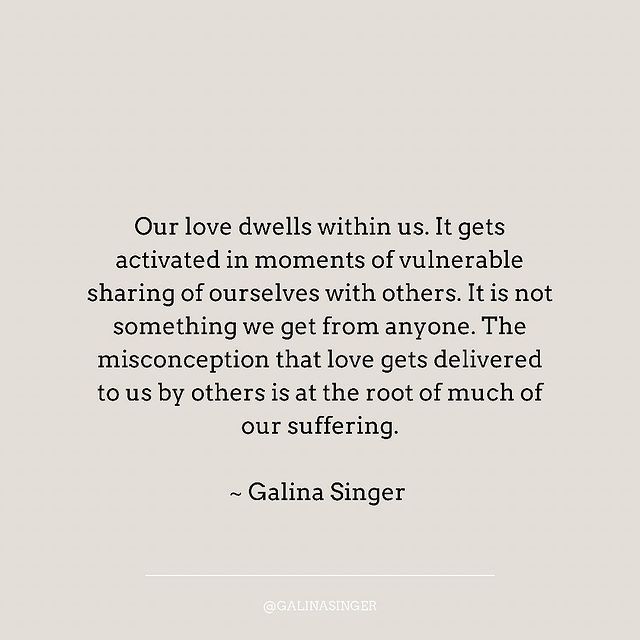
Everything that we feel is about our relationship with ourselves
Even with my own children I sometimes find it easier to be patient and loving than others.
I used to think that my readiness to be generous and kind had to do with the other people: some people are just easier to love. But now I understand that my kindness and generosity have to do with the state of my own nervous system and my overall psycho-emotional state. An irritating phrase or behavior can cause only a slight reaction, even amusement when I am happy and at peace. Whereas the same gesture may cause me to blow up when I’m tired, overextended, or unwell.
Everything that we feel – love, hate, and everything in-between – reveals more about us, our beliefs, and our relationship with ourselves, than about the person to whom we are reacting.
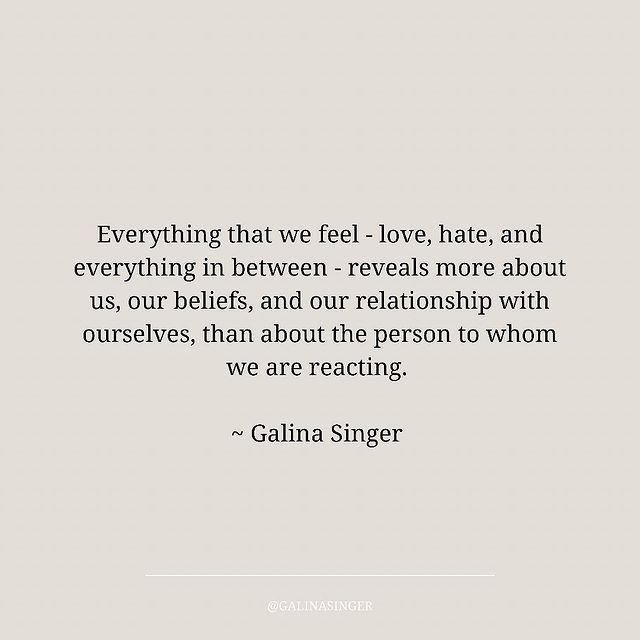
Conscious relationships respect the sovereignty
Our childhood experiences and traumas play out in our adult relationships.
Our attachment styles dictate how we show up in relationships and inform our core needs.
So the promise of “forever” and exclusivity may calm a lot of our survival-based fears – for a time.
It seems to me that modern partnerships are under pressure to evolve from the inherited prescriptions.
Coming out of co-dependent and trauma-bonding relationships we are interested in less hierarchical, more co-creative relationships.
Conscious relationships respect the sovereignty of each individual and require us to heal our mother and father wound-based patterns.
Whether monogamous or non-monogamous, conscious relationships require 100% self-accountability of our own thoughts, emotions, perceptions, decisions, and actions.
This means we cannot hold the other responsible for the feelings that we experience in our own bodies.
Feelings like jealousy or absence of safety are signs of our own trauma and attachment wounds and under our own responsibility to address.
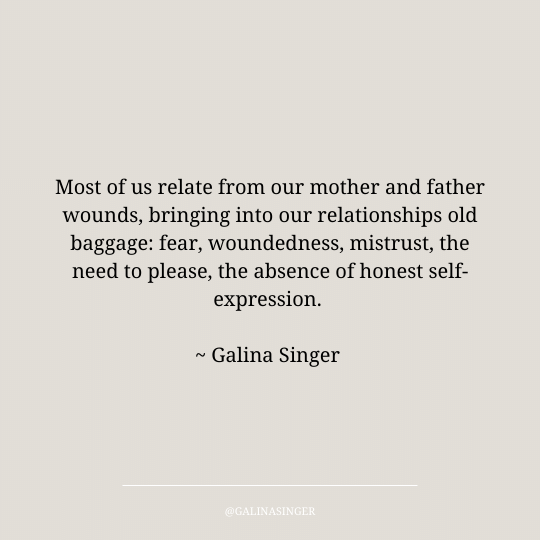
Opening to receive love that is already available
We spend so much effort on determining how we want to get love.
Identifying our love language, specifying the qualities and credentials that we want our partners – love deliverers- to have.
Not only do we place conditions on how and to whom we give love, we limit and place conditions on how and from whom we receive love.
And yet we all want love, and suffer when we do not see it forthcoming. I attribute that sense of scarcity to our inability to receive love – which is always available.
We want love to be delivered in a specific love language, but why not instead learn to receive love from people and circumstances in the way that they come to us? Can we allow others to be themselves and flow freely and be grateful for the way they love us already?
I noticed that it was much easier for me to receive love when I started to take care of my own needs. Then anything that came from others was a beautiful gift. I did not hold them responsible as love deliverers, so anything that they gave was given freely and of their own initiative. Those feel the best anyway.
You are the main character in your life story.
Everyone else—partners, children, bosses, siblings, and friends—is the supporting cast.
I will show you how to make decisions from this new vision of your reality.
You will learn that when we love and take care of ourselves so well that our inner light starts to shine brightly, all the people in our life story get to bask in it.
Meet me for a 30-minute introductory conversation >>
Your relationships begin with you.
